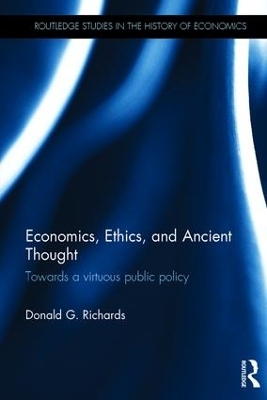
Economics, Ethics, and Ancient Thought
Towards a virtuous public policy
Seiten
2017
Routledge (Verlag)
978-1-138-84026-3 (ISBN)
Routledge (Verlag)
978-1-138-84026-3 (ISBN)
It is argued that the normative and ethical presuppositions of standard economics render the discipline incapable of addressing an important class of problems involving human choices. Economics adopts too thin an account both of human motivation and of "the good" for individuals and for society. It is recommended that economists and policy-makers look back to ancient philosophy for guidance on the good life and good society considered in terms of eudaimonism, or human flourishing.
Economics, Ethics, and Ancient Thought begins by outlining the limitations of the normative and ethical presuppositions that underpin standard economic theory, before going on to suggest alternative normative and ethical traditions that can supplement or replace those associated with standard economic thinking. In particular, this book considers the ethical thought of ancient thinkers, particularly the ancient Greeks and their concept of eudaimonia, arguing that within those traditions better alternatives can be found to the rational choice utilitarianism characteristic of modern economic theory and policy.
This volume is of great interest to those who study economic theory and philosophy, history of economic thought and philosophy of social science, as well as public policy professionals.
Economics, Ethics, and Ancient Thought begins by outlining the limitations of the normative and ethical presuppositions that underpin standard economic theory, before going on to suggest alternative normative and ethical traditions that can supplement or replace those associated with standard economic thinking. In particular, this book considers the ethical thought of ancient thinkers, particularly the ancient Greeks and their concept of eudaimonia, arguing that within those traditions better alternatives can be found to the rational choice utilitarianism characteristic of modern economic theory and policy.
This volume is of great interest to those who study economic theory and philosophy, history of economic thought and philosophy of social science, as well as public policy professionals.
Donald G. Richards is Professor of Economics at Indiana State University. His research interests have focused on international economics and international political economy, writing on intellectual property rights and welfare. In recent years his research has concentrated on sustainability and the environment.
PART I Ethics and economics
1 Introduction
2 Eudaimonia: the ancients and the good life
3 The impact of the ancients
4 Conceptions of rationality: thin, thick, and ancient
PART II Ethics and public policy
5 The problem of pathological consumption
6 Economics, ethics, and the environment
7 Reason, ethics, and the end of life
8 Towards a virtuous public finance
9 Final thoughts on virtue, the market, and policy
| Erscheinungsdatum | 24.05.2016 |
|---|---|
| Reihe/Serie | Routledge Studies in the History of Economics |
| Verlagsort | London |
| Sprache | englisch |
| Maße | 156 x 234 mm |
| Gewicht | 408 g |
| Themenwelt | Geschichte ► Teilgebiete der Geschichte ► Wirtschaftsgeschichte |
| Geisteswissenschaften ► Philosophie ► Philosophie Altertum / Antike | |
| Wirtschaft ► Allgemeines / Lexika | |
| Wirtschaft ► Volkswirtschaftslehre ► Wirtschaftspolitik | |
| ISBN-10 | 1-138-84026-2 / 1138840262 |
| ISBN-13 | 978-1-138-84026-3 / 9781138840263 |
| Zustand | Neuware |
| Haben Sie eine Frage zum Produkt? |
Mehr entdecken
aus dem Bereich
aus dem Bereich


